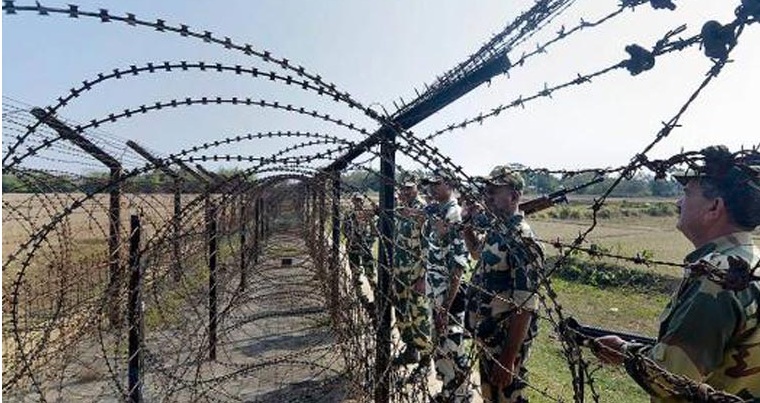
Border killing on rise again

The Indian Border Security Force has increased killing of Bangladeshi citizens over the last six months as the force was going with impunity and lack of accountability, rights groups on both sides of the borders observed.
The BSF enjoys impunity and enormous power without accountability and appropriate checks, Kirity Roy, secretary of Banglar Manabadhikar Suraksha Mancha, said in an email to New Age on Friday.
The BSF is running a campaign of systematic killing and torture turning the border into one of the world’s most dangerous places, he said with reference to studies conducted by rights groups.
Kirity Roy contradicted the BSF claims that the border killings occur when the force launches operations against irregular movement of people and smuggling along the border.
‘But if we consider the victims, we might notice that the aggressive approach [of BSF members] has a lot to do with caste, religion and other sociological status of the victims. Especially, the impact is more severe when a right-wing government is there [in India],’ he said.
In the last six months till July, at least 25 Bangladeshis were killed by the BSF, showed a report of rights organisation Odhikar.
Two more people were reportedly killed at Chapainawabganj and Thakurgaon borders in the first week of July.
Since 2011 border killings had started coming down but the incidents began to rise again in 2019 when 41 people were killed by the force, almost four times the fatalities in 2018 when 11 such killings took place, according to Odhikar data.
At least 1,185 Bangladeshis were killed along the border by the BSF since 2000, the data shows.
On Saturday morning, a Bangladeshi national was shot dead by the BSF at Telkupi border in Chapainawabganj’s Shibganj upazila.
The victim, Jahangir Alam, 50, was picked up by BSF members when he went to cut grass on a piece of land near the border and was taken to their camp at around 9:00am.
The personnel tortured him there, later shot him dead and dumped his body inside Bangladeshi territory.
Another Bangladeshi national Abdul Jalil was shot to death by the BSF in the bordering area of Haluaghat in Mymensingh on June 24. Family sources said that Jalil was a mentally challenged person.
The following day, another youth named Mizanur Rahman was gunned down by the Indian force at Shamsernagar border in Patgram upazila of Lalmonirhat district as he was fetching cows from India.
Rights groups say that the BSF uses lethal weapons to show to the outer world that they are containing crimes, as well as to hide the activities of international smuggler groups who operate in connivance with sections of government officials posted in bordering areas.
The BSF groups that are deployed along the Bangladesh-India border generally possess such socio-lingual and cultural characteristics which are totally different from those of the citizens living on the both sides of the border, the groups added.
Security experts said that India considered Bangladesh border management as ‘soft’ and ‘weak’ and that’s why they had been showing an aggressive attitude here, compared to the borders with other countries.
Bangladesh Institute of Peace and Security Studies president Muniruzzaman told New Age that India was not taking the issue seriously and the Bangladeshi authorities were not also protesting strongly.
‘India finds Bangladeshi border security management ‘soft’ and ‘weak’, that’s why they act aggressively,’ he observed.
‘It is no longer an issue between the border security forces, rather it must be resolved at the political level with dialogue, commitment and good will,’ added Muniruzzaman, who is a retired major general of Bangladesh Army.
India shares border with some other countries, but it does not have such aggressive attitudes to the people of those countries. Lethal weapons are not used in many cases against people of China, Myanmar, Nepal and Bhutan, with the exception of Pakistan, he said.
Border Security Guard additional director general for operations and training Jalal Ghani Khan told New Age that they were raising the border killing issue at BSF flag meetings and bilateral conferences.
‘When incidents happen, we approach to the BSF in flag meetings, but they simply deny their responsibilities in the incidents,’ he said.
According to BGB data, about 23 lakh cattle heads entered Bangladesh ahead of Eid-ul-Azha in 2013, while only 92,000 were brought in at the same time last year.
The BSF repeatedly assured Bangladesh that border killings would drop if the cattle smuggling was stopped.
Jalal Ghani said that they were undertaking projects to increase the earnings and improve the livelihood of bordering people so that they did not have to go to India for fetching cattle or for any other purpose.
The efforts
Editor & Publisher: S. M. Mesbah Uddin
Published by the Editor from House-45,
Road-3, Section-12, Pallabi, Mirpur
Dhaka-1216, Bangladesh
Call: +01713180024 & 0167 538 3357
News & Commercial Office :
Phone: 096 9612 7234 & 096 1175 5298
e-mail: financialpostbd@gmail.com
HAC & Marketing (Advertisement)
Call: 01616 521 297
e-mail: tdfpad@gmail.com